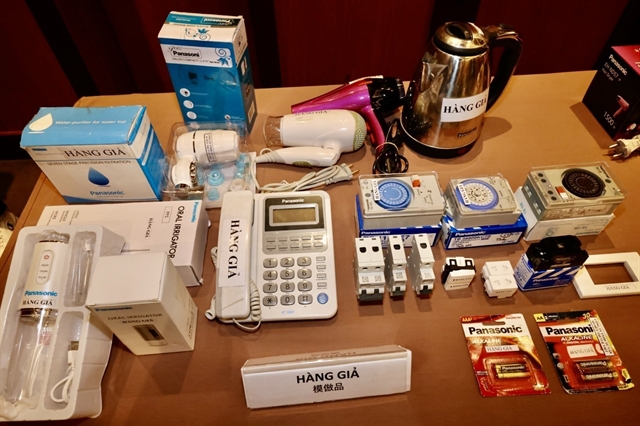_med.jpg) Economy
Economy


|
| The domestic market has many goods counterfeiting the Japanese trademark Panasonic. —VNA/VNS Photo |
HÀ NỘI — Japan was suggested to continue its support to Việt Nam in protecting and enforcing intellectual property (IP) rights, making IP a driving force for economic development.
The suggestion was made at a workshop on IP rights held in Hà Nội this week by the Japan Patent Office (JPO) and the Japan External Trade Organisation (JETRO) in coordination with the Việt Nam Directorate of Market Surveillance under the Ministry of Industry and Trade (MoIT) and the Vietnamese Ministry of Science and Technology (MoST).
Japanese Deputy Ambassador to Việt Nam Shige Watanabe expressed his hope that measures against counterfeit goods will be rolled out appropriately in Việt Nam, legitimately protecting IP rights and improving its business environment.
Nguyễn Thanh Bình, deputy director general of the Việt Nam Directorate of Market Surveillance (DMS), pointed to the prevalence of counterfeit goods, those infringing IP rights, and goods of unknown origin in Việt Nam, with over 9,000 cases handled last year.
He stressed obstacles to the fight against counterfeit goods like the overlapping law enforcement mechanisms and the loose coordination between agencies.
Citing the Prime Minister’s Decision 319/QĐ-TTg dated March 29, 2023 approving a project on fighting counterfeit goods and protecting consumers in e-commerce by 2025, the official said the market surveillance force would step up inspections of online business in the time ahead.
According to this project, State agencies will improve the system of policies and laws on inspection and handling of administrative violations, standards, measurement, product quality and goods labels in e-commerce activities, said Nguyễn Đức Lê, deputy director of the Professional Department, the Vietnam Directorate of Market Surveillance.
Infrastructure and technology development must also be carried out, besides building a database system on anti-counterfeiting and consumer protection, he said.
All enforcement staff and civil servants are trained to have knowledge about e-commerce, and good skills.
Meanwhile, major e-commerce platforms have a commitment not to trade counterfeit goods.
Lê also proposed that Japanese businesses having products sold in Việt Nam strengthen coordination, provide information and appoint legal representatives to support the inspection and handling of violations by DMS.
In 2024, DMS and JPO needed to coordinate to organise meetings between holders of intellectual property rights for Japanese trademarks and representatives of those holders in Việt Nam to create a basis for coordination in the future, he said.
The two bodies need to enhance seminars on sharing experiences of JPO and Japanese authorities in the fight against counterfeit goods and goods infringing intellectual property rights.
They also should have specialised training courses on preventing and combatting counterfeit goods, goods infringing intellectual property rights, and managing and supervising e-commerce activities.
Lê said that in the past years, the market management force synchronously deployed solutions such as propaganda, improvement of enforcement capacity, and increase of inspection.
According to Nguyễn Như Quỳnh, Ministry of Science and Technology (MoST)'s Chief Inspector, there are still many difficulties in protecting intellectual property rights, partly due to constant changes in violations and limited capacity of enforcement officers.
Thus, it is necessary to improve legal policies, strengthen training to improve human resources, and raise consumer awareness. Because if customers still accept fake products, all anti-counterfeit measures by management agencies will be not effective.
In addition, the context of the great impact of international trade activities, the 4.0 Industrial Revolution, the explosion of e-commerce activities and the change in awareness of businesses and consumers all lead to new opportunities and challenges for IP enforcement activities in Việt Nam.
In the digital environment, IP infringements are more sophisticated with different violations occurring at the same time.
Quỳnh suggested Japan further its support to Việt Nam in socio-economic development and IP protection.
On this occasion, six Japanese companies, ASICS, Kikkoman, Kubota, Kokuyo, Daiichi Sankyo Healthcare and Panasonic, gave detailed instructions on how to identify fake products, and introduced measures to prevent counterfeit goods in Việt Nam. VNS




